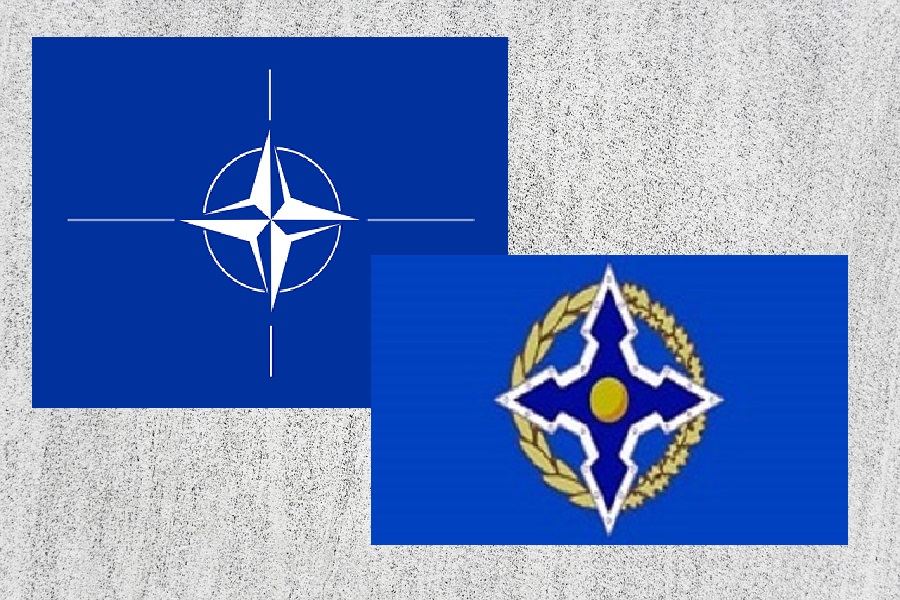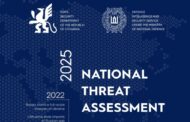Deputy Foreign Minister Alexander Grushko’s interview with Interfax news agency
April 17, 2018
_____________________________________________________________________________________________________________________________________
Question: Mr Grushko, Brussels prefers not to notice other Eurasian security organisations, including the Collective Security Treaty Organisation (CSTO). So far, Brussels has failed to meet with understanding the idea of inter-institutional dialogue between NATO and the CSTO, being insistently advocated by Moscow and its CSTO allies. What changes in global politics are needed to change this situation and to compel NATO to become more responsive to dialogue with its Eastern partners?
Alexander Grushko: Obviously, the problem of launching direct dialogue between the CSTO and NATO can be explained by the entirely different nature of these organisations.
NATO, the result of the Cold War-era military confrontation, has proved unable to renounce its ideology which is almost 70 years old and which is based on the external-enemy myth. If there is no such enemy, then it must be invented, otherwise any motives for the bloc’s existence would disappear. The alliance’s “old” new line to contain Russia merely confirms its failure to get rid of the bygone paradigm.
The CSTO was established in the absence of confrontation between blocs, but for jointly countering security challenges. The Organisation contains no one and does not claim the right to act as “the global police.” On the contrary, it is open for cooperation and consistently expands its relations with the UN, the OSCE, the CIS, the SCO and other concerned parties to international relations for joining efforts to address topical matters. It is simply impossible to try and build secure areas in a modern globalised world because neither separate states, nor even interstate associations can independently cope with trans-border threats. Unfortunately, far from everyone has so far understood it.
Question: What does Moscow think about possible CSTO-NATO cooperation to resolve the situation in Afghanistan?
Alexander Grushko: Longtime and large-scale foreign military presence in Afghanistan under the auspices of NATO does not improve the military-political situation in this country. Instead of diminishing, the threats of terrorism and illegal drug trafficking have increased many times over. All this once again shows the need for entirely new approaches and actions hinging on comprehensive efforts of all states and international organisations.
Operation Channel was launched virtually after the CSTO’s establishment, with the UN recognising it as the largest and most effective operation to thwart illegal drug trafficking from Afghanistan. Although a number of NATO countries became involved in the operation in various formats, the bloc failed to overcome ideologised approaches and to establish relations of cooperation between organisations serving as key security factors in the Euro-Atlantic region.
Indicatively, no one in NATO has openly contested potential benefits from joint efforts to stabilise Afghanistan and neutralise threats emanating from it. But, in the long run, the political arrogance of Brussels has become an obstacle to launching effective cooperation between the CSTO and NATO.
Question: The Trump administration has requested $6.5 billion for the next fiscal year (starts in October 2018) to “contain the Russian aggression” in Europe, or $1.7 billion more than this year. More funds will be allocated for weapons, ammunition and upgrades of tanks and combat vehicles. How will this affect security on the CSTO’s European flank? How should the CSTO respond to the US and allied military preparations – by displaying restraint, intensifying military exercises, or deploying in the region the latest weapons systems that President Putin mentioned on March 1?
Alexander Grushko: The North Atlantic Alliance and its individual member-countries, primarily the United States, are implementing a package of measures to build up its military potential near the CSTO borders. The direct consequence of NATO’s military preparations that are unprecedented in the history of the last 30 years is the swelling of conflict potential, growing distrust, as well as the disruption of the existing balance of forces in Europe.
The constantly growing costs of “containing” Russia and strengthening the “eastern flank” are meant to create a firm basis for these deployments. When NATO representatives tell us that these steps are “defensive and proportionate,” a question arises: Why launch a years-long programme envisaging a surge in defence spending, hustle those who fall behind, and aggressively spur on arms purchases and modernisation? Clearly, the statements coming out of NATO leaders that they are “interested in improving relations with Russia” are at odds with reality, with the alliance opting for a long-term and irreversible militarisation of Europe.
The CSTO’s approaches to ensuring security, sovereignty and territorial integrity are reflected in the Collective Security Strategy for the period up to 2025. Let me remind you that NATO is not mentioned in its list of external challenges and threats, because neither the alliance as a whole, nor its individual member-countries are regarded as adversaries. But an increase in military activities in territories contiguous on the CSTO’s area of responsibility is certainly affecting the interests of all its member-countries. The allies are unanimous in their assessment of negative processes on the continent. At the end of last year, the CSTO circulated a joint statement by its member-countries in the Euro-Atlantic Partnership Council, which said that any attempts to provide for their own security at the expense of other states’ security were unacceptable and expressed concern over the build-up of the existing military groupings and deployment of new ones, the creation of military infrastructure near the CSTO borders, and the policy of containment.
Question: NATO’s expansion strategy has not changed and will likely be continued. The bloc has shifted its focus to the Western Balkans and has increased its efforts to involve Ukraine and Georgia in its operations. What can be the effect of these processes on the CSTO’s collective security? What measures can the CSTO take to counter them?
Alexander Grushko: NATO is moving its military infrastructure towards the CSTO’s borders by expanding its membership, which is disrupting the European security space and creating new dividing lines on the continent. Moreover, the example of Georgia has shown that the promises of NATO membership are interpreted by some governments as a licence to use military methods to deal with their problems and are fostering the feeling of permissiveness and impunity. This also applies to Ukraine, which is using NATO support to neglect its international commitments, including under the Minsk Package of Measures.
Back in the past, Russia contributed to eliminating the remnants of the bloc confrontation period by withdrawing its troops from Germany and other Central and Eastern European countries, and subsequently from the Baltics, as well as by honouring its pledge to reduce conventional forces and nuclear weapons. In response, NATO has carried out three waves of enlargement in violation of the promises to the contrary made to the Soviet Union. The opportunity to create a truly collective security system was missed.
As of now, the NATO military are not only becoming established on the territory of the new members but are also spreading its operations to Russia’s neighbours. They regularly call at the ports of Georgia, Finland, Sweden and Ukraine and hold joint military exercises with them within the framework of enhanced opportunities partnership. This amounts to an accelerated militarisation of the once most militarily tranquil Baltic and Northern European countries. Military and political tensions are growing in the South Caucasus and the Black Sea area, and the settlement of the internal Ukrainian crisis is being dragged out.
Possible steps to de-escalate the situation and reduce the risk of unpremeditated incidents could include the reduction of military activities near the CSTO’s zone of responsibility, the withdrawal of permanently deployed or rotational forces to their home stations, as well as the termination of the military superiority policy. The CSTO member states pointed this out in the joint statement mentioned above.
Question: The NATO countries have sided with the UK, which accused Russia of involvement in the so-called Skripal case. What does Moscow think about this NATO solidarity, which has been offered before the causes of the Salisbury incident were reliably established? Can this become yet another factor complicating Russia-NATO relations?
Alexander Grushko: These actions by the UK and its NATO allies did not come as a surprise to us. It is obvious that they needed new arguments in favour of enhancing their military activity on the eastern flank ahead of the Brussels summit scheduled for July. This is why they have launched this absurd campaign to reinforce the enemy image of Russia. NATO’s deterrence plans regarding Russia will always need political and ideological backing. We must be ready for more campaigns such as the Skripal case.
Question: How does NATO respond to Russia’s calls to resume a military dialogue? Are there any plans to prepare for a meeting between Chief of the General Staff of Russia’s Armed Forces Valery Gerasimov and Supreme Allied Commander Europe Curtis M. Scaparrotti in the near future or to maintain any other military contacts?
Alexander Grushko: Indeed, Russia and NATO made certain headway in the establishment of contacts between their respective military leaders last year. In March 2017, Chief of the General Staff of Russia’s Armed Forces and First Deputy Defence Minister Valery Gerasimov spoke by telephone with Chairman of the NATO Military Committee Petr Pavel. This conversation became the first high-level contact between Russian and NATO military leaders after the bloc’s decision to “freeze” relations with Russia. They met in Baku in September 2017. After their meeting, Valery Gerasimov had a telephone conversation with Supreme Allied Commander Europe Curtis M. Scaparrotti. Their face-to-face meeting was discussed via their March 2018 telephone conversation.
NATO leaders regularly note the need for meaningful dialogue and efforts to achieve de-escalation as well as to prevent unintentional incidents. But their practical steps, including efforts to scale down our diplomatic and military presence in Brussels, merely annul prospects for the normalisation of relations.
Question: Have the sides set forth deadlines for holding a new meeting of the Russia-NATO Council? What are the most topical matters on the current agenda?
Alexander Grushko: The latest events, including the expulsion of Russian diplomats from NATO member-countries and the reduction of the personnel of the Russian Permanent Mission to NATO in Brussels by one-third, hardly correlate with the alliance’s statements voicing its interest in convening a regular meeting of the Russia-NATO Council.
Question: The Ambassador of Poland has recently expressed his concern with the allegedly unjustified militarisation of the Kaliningrad Region. He also said that Warsaw was interested in deploying a permanent NATO military contingent in Poland, in connection with threats emanating from Russia. What is your reply to this?
Alexander Grushko: First of all, I would like to repeat that such statements made by NATO representatives about the existence of some “Russian threat” mostly aim to brainwash public opinion. A professional evaluation of our military potentials shows that it is precisely Russia which should boost its defence capability. This is exactly what we are doing in the region in the context of heightened NATO activities.
In short, it is precisely NATO’s large-scale military buildup which is the main factor of destabilising the military-political situation in Europe. I would like to point out that the increasingly more active militarisation of Poland which initiates common European initiatives against Russia is one of the main elements of this destabilisation. Predictably, Russia is forced to implement military-technical measures in response to inciting tension in direct proximity to its borders. These measures are purely defensive and are more cost-efficient.
Regarding Warsaw’s desire to ensure the permanent deployment of NATO’s forces and resources in Poland, this runs counter to a key provision of the 1997 Russia-NATO Founding Act, namely, an obligation to refrain from the additional permanent deployment of substantial military forces in the new NATO member-countries.
* * * * *
Zdroj: http://www.mid.ru/ru/foreign_policy/news/-/asset_publisher/cKNonkJE02Bw/content/id/3176788?p_p_id=101_INSTANCE_cKNonkJE02Bw&_101_INSTANCE_cKNonkJE02Bw_languageId=en_GB







